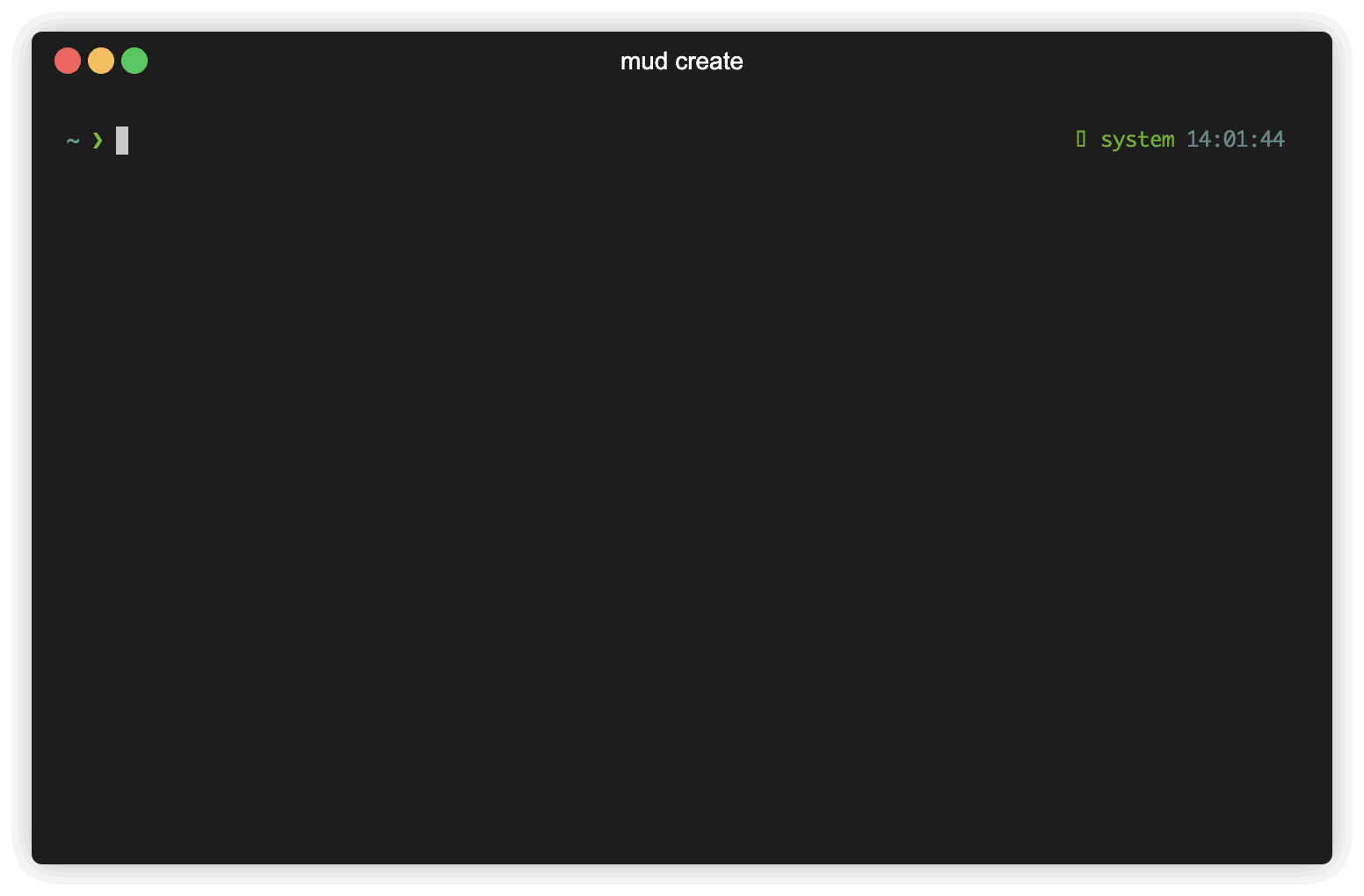#
Getting started
#
Quickstart
Let's create our first MUD project!
You will need:
- git (download)
- foundry (forge, anvil, cast) (download, make sure to
foundryupat least once) - node.js (v16+) (download)
- yarn (after installing node:
npm install yarn --global)
If you are running Windows, you will need to setup WSL and configure it properly. The libraries and tools listed above need to be installed in the WSL. All commands below also need to be executed in the WSL.
We recommend reading the WSL guide from Microsoft to get started.
Run the following command in the console of your choice to create a new MUD project in my-project using the minimal template.
yarn create mud my-project --template minimalNext, run yarn dev in the root directory of your new project to start the development server (web client and local Ethereum node).
yarn dev
The minimal MUD project template is organized as a yarn monorepo.
You can find the contract code in packages/contracts and then minimal client setup in packages/client.
$ tree . -d -L 4
.
└── packages
├── client
│ └── src
└── contracts
└── src
├── components
├── libraries
├── systems
└── test
9 directories
#
Contracts
Contracts are structured in a forge compatible Solidity project. Naming and code organization follows conventions, which allows MUD tools to automate much of the deployment process and improve the development experience.
#
Components
Component definitions are placed in src/components.
As a convention, each component must be kept in its own file, with the file name corresponding to the name of the component contract inside the file.
Additionally, the file and contract name must follow the schema <NAME>Component.
Besides the component contract, the file must include the component's ID as a constant.
Example: CounterComponent.sol
// SPDX-License-Identifier: MIT
pragma solidity >=0.8.0;
import "std-contracts/components/Uint32Component.sol";
uint256 constant ID = uint256(keccak256("component.Counter"));
contract CounterComponent is Uint32Component {
constructor(address world) Uint32Component(world, ID) {}
}
#
Systems
Systems are placed in src/systems.
Similar to components, each system must be kept in its own file, with the file name corresponding to the name of the system contract inside the file.
File and contract names must follow the schema <NAME>System, and the file must include the system's ID as constant.
When using the mud deploy-contracts --dev --watch cli command, the MUD cli watches for changes in system files (and imported libraries) and automatically upgrades the relevant systems if necessary.
Example: IncrementSystem.sol
// SPDX-License-Identifier: MIT
pragma solidity >=0.8.0;
import { System, IWorld } from "solecs/System.sol";
import { getAddressById } from "solecs/utils.sol";
import { CounterComponent, ID as CounterComponentID } from "components/CounterComponent.sol";
import { LibMath } from "libraries/LibMath.sol";
uint256 constant ID = uint256(keccak256("system.Increment"));
contract IncrementSystem is System {
constructor(IWorld _world, address _components) System(_world, _components) {}
function execute(bytes memory arguments) public returns (bytes memory) {
uint256 entity = abi.decode(arguments, (uint256));
CounterComponent c = CounterComponent(getAddressById(components, CounterComponentID));
LibMath.increment(c, entity);
}
}
#
Libraries
Libraries can be used to split up code into reusable packets.
They are placed in src/libraries.
All code in libraries is executed in the context of the calling contract (because they are inlined or delegate called), so component write access control needs to happen at the level of systems.
Example: LibMath.sol:
// SPDX-License-Identifier: MIT
pragma solidity >=0.8.0;
import { Uint32Component } from "std-contracts/components/Uint32Component.sol";
library LibMath {
function increment(Uint32Component component, uint256 entity) internal {
uint32 current = component.has(entity) ? component.getValue(entity) : 0;
component.set(entity, current + 10);
}
}
#
Deployment configuration
Deployment configuration lives in deploy.json.
It contains the list of components and systems to deploy, and which systems needs write access to which systems.
This file is the source of truth for MUD's deployment tools.
If a component or system is not included, it is not deployed, even if it is placed in the components or systems directory.
The initializers field in the deploy.json file allows the specification of libraries that implement a function named init which takes a single argument IWorld. This init function is executed after the deployment of the world, components, and systems, as part of the deployment process (e.g. LibInitData.init(world)).
Initializers should be in the libraries directory.
Example: deploy.json
{
"components": ["CounterComponent"],
"systems": [
{
"name": "IncrementSystem",
"writeAccess": ["CounterComponent"]
}
],
"initializers": ["LibInitData"]
}
#
Tests
MUD uses forge for Solidity testing.
Test files are placed in src/tests.
To take full advantage of MUD's deployment setup in tests, they must extend MudTest (imported from @latticexyz/std-contracts/test/MudTest.t.sol).
Head over to the forge documentation for more details on how to write tests with forge.
Example: Deploy.t.sol
// SPDX-License-Identifier: MIT
pragma solidity >=0.8.0;
import { Deploy } from "./Deploy.sol";
import "std-contracts/test/MudTest.t.sol";
contract DeployTest is MudTest {
constructor() MudTest(new Deploy()) {}
function testDeploy() public view {
console.log(deployer);
}
}
#
Development
To start a local Ethereum node, run yarn devnode at the root of the contracts directory.
This starts a local anvil instance with 1 second blocktime.
For more information about anvil, head over to the anvil documentation.
To deploy the contracts to the local node, run yarn dev from the root of the contracts directory (which calls mud deploy-contracts --dev --watch under the hood).
After deploying, it will set up a watcher to detect file changes in system files or libraries and automatically redeploy impacted systems.

